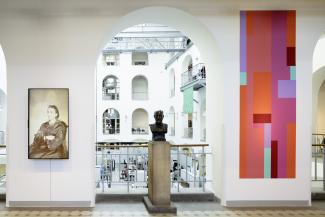
Technische Universität Dresden
The Schaufler Lab @ TU Dresden, TU Dresden and THE SCHAUFLER FOUNDATION have established a lively forum for a forward-looking dialogue between science, art and society. In this project, young researchers and artists come together across disciplinary boundaries to question current technologies, their origins, and their impacts on the modern world. The Schaufler Lab @ TU Dresden consists of the Schaufler Kolleg @ TU Dresden and the Schaufler Residency @ TU Dresden. It brings together (early-career) researchers and international artists. Both the fellows and the artists are committed to an explicitly transdisciplinary research methodology at the interface between science and art. In the Schaufler Lab @ TU Dresden, researchers and scholarship holders from various disciplines in the humanities and social sciences cooperate with artists as well as with researchers from the STEM subjects (science, technology, engineering, and mathematics). Partner institutions are TU Dresden's Clusters of Excellence.
An artist in residence position is open, starting in 2022 and continuing for a 6-month period, in the Office for Academic Heritage, a major division of Technische Universität Dresden. The position is for the Schaufler Lab @ TU Dresden, co-financed by THE SCHAUFLER FOUNDATION and TU Dresden.
At Schaufler Lab @ TU Dresden, researchers and artists engage in an exploration of the interactions among technology, art, science and entrepreneurship. The focus is primarily on technology as a resource, as a means of distribution and as an element of discourse. In the first of three planned funding periods (2019–2022), the Lab’s guiding theme is “Artificial Intelligence and Social Transformation.” The topic sets the stage for research, artistic activity and communication with the wider public regarding the relationship between technological developments and social and cultural change from the perspective of the humanities and social sciences. The Schaufler Lab @ TU Dresden includes 10 positions for doctoral students and an artist in residence program.
They would like to give committed, internationally active artists the unique opportunity to work in a collaborative community of researchers and students and to use the university’s resources for artistic and creative projects for a 6-month period.
Projects should focus on the interface between art and science/scholarship, explicitly artistic intelligence and its implications for society and the culture of objects. The residency expects to organize a Solo exhibition at the conclusion of the residency and to publish a catalogue by a respected fine arts publishing house.
The Open Studio serves not only as a studio for the artist, but also as a public forum for the interaction with both scientists from the University and the public.
The organisers will offer assistance for finding accommodation.
Access to a competitive array of institutes and workshops for artistic research.





